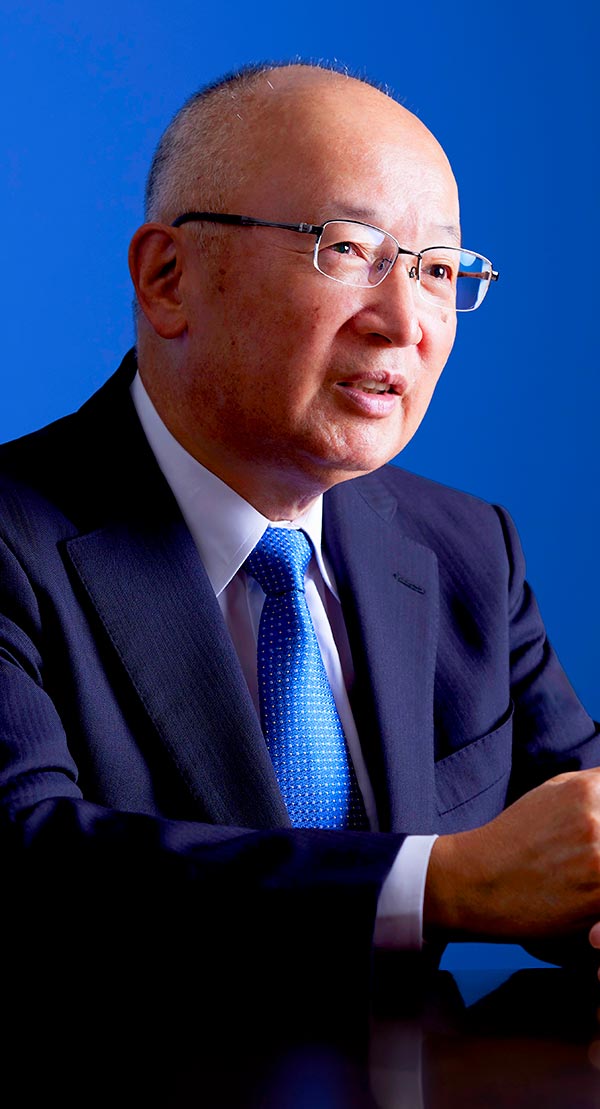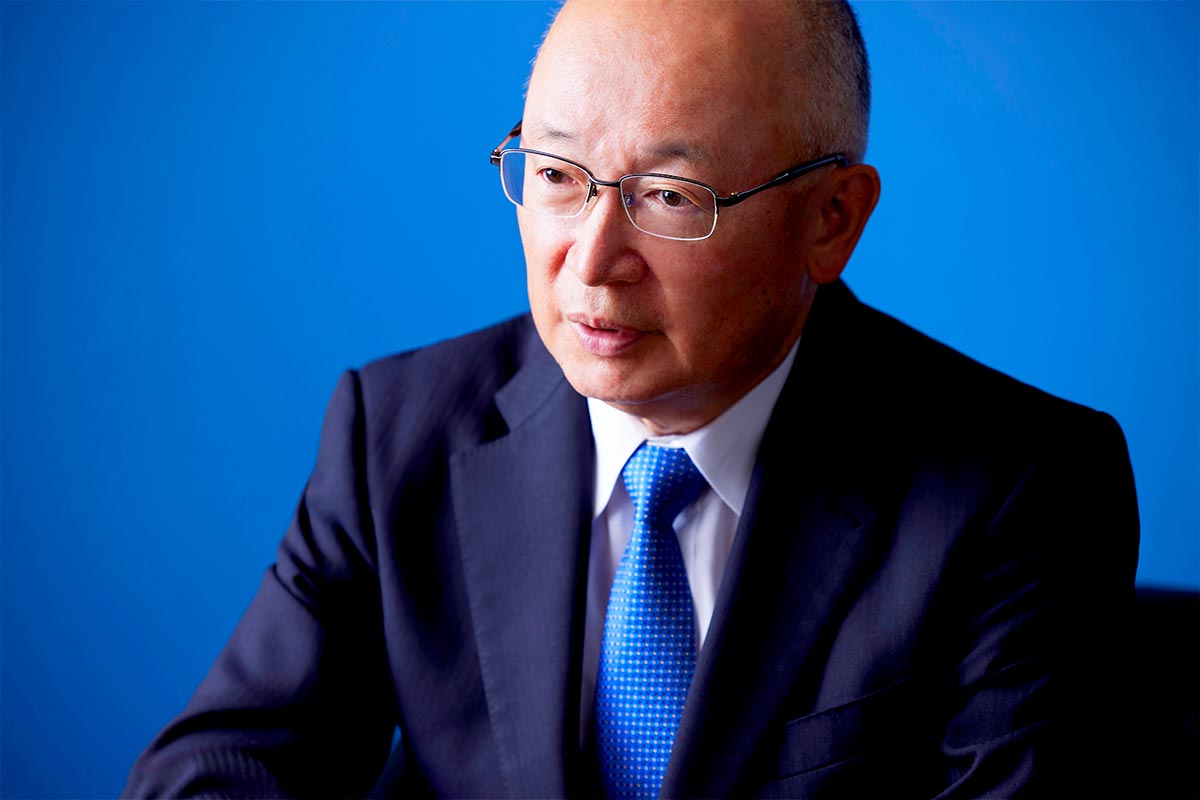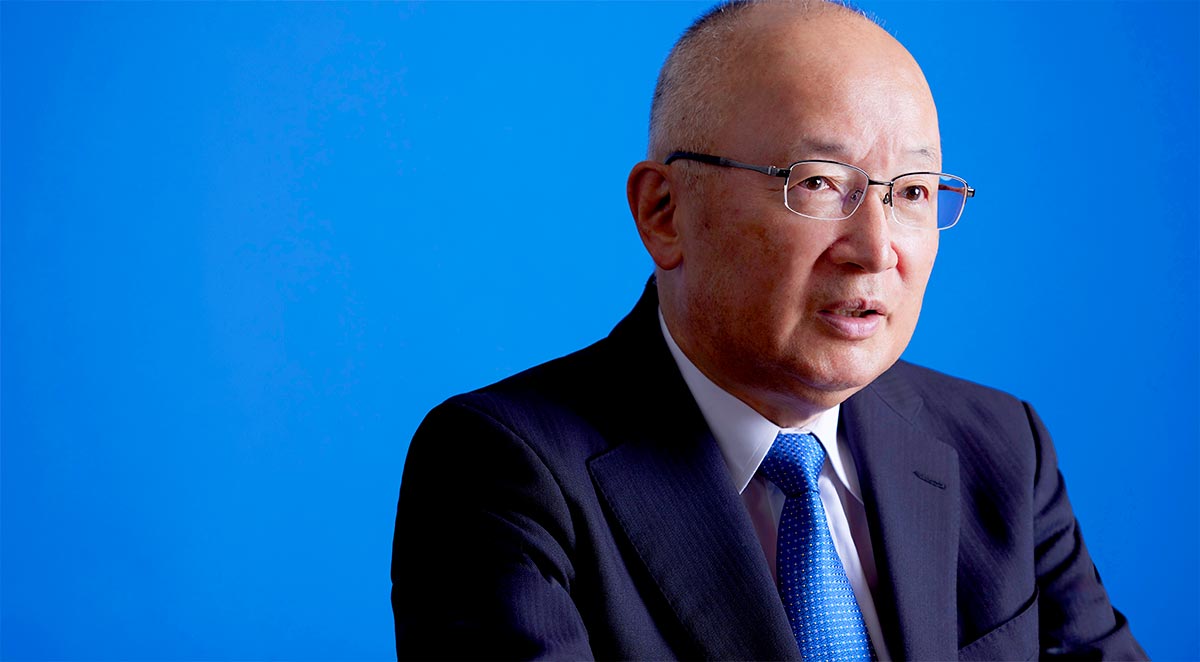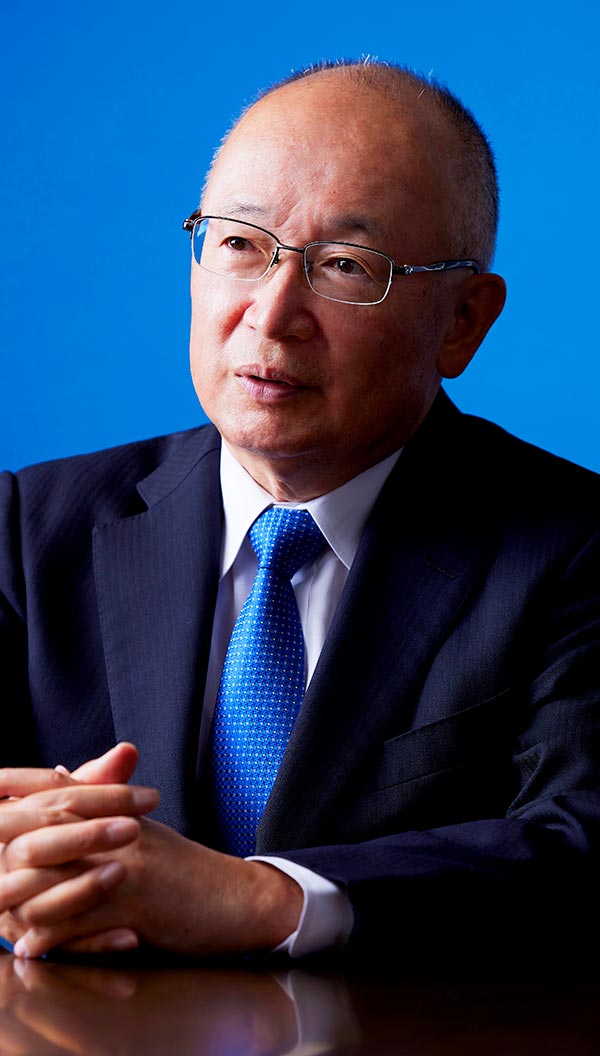- JP
- EN
Message
from the
CEO
My Mission:
Achieving Growth Together
with Stable Management
Empowering the Strong -
toward the completion of MOL Group Corporate
Management Plan "BLUE ACTION 2035 Phase 1

President & CEO
This message is from the MOL Report 2025.
The foundation for the MOL Group's target business portfolio has been laid within Phase 1 period (FY2023-2025)

The transformation of the entire business portfolio is the key goal set forth in BLUE ACTION 2035. Our group, which has established its business foundation in the shipping industry, a typical cyclical industry, has faced challenges in stabilizing financial performance and stock prices amidst the fluctuations of the shipping market. To ensure continuous growth and stable returns to our shareholders, transforming our business portfolio to be less susceptible to market conditions is the top priority. Over the past two years, investments have progressed at a speed exceeding the initial plan, and the business foundation is steadily being established toward the business portfolio our group aims for by 2035.
Specifically, to increase the ratio of non-shipping businesses, which differ from the traditional shipping industry with strong market volatility, we have invested in offshore businesses, real property business, and cruise business. In June 2025, we acquired all shares of LBC Tank Terminals Group Holding Netherlands Coöperatief U.A., a major tank terminal operator handling chemicals primarily in Europe and the U.S., to strengthen our chemical logistics business. Additionally, to address the important theme of decarbonization, we have expanded investments in offshore wind power projects and upstream projects for ammonia and methanol, which are considered key future alternative fuels.
However, various challenges have emerged with the progress of investments. Particularly in advancing new businesses and overseas businesses that are rooted in regional market, it has become difficult to develop business with our conventional organizational structure sufficiently. To enhance profitability and sustain growth, simply continuing investments is not enough, we strongly feel the need to strengthen our organization and human capital. Success cannot be achieved by merely acquiring assets; the major challenge ahead is how to create a profitable and sustainable business structure. Therefore, in Phase 2, starting from fiscal 2026, it is crucial to focus considerable effort on nurturing the organization and human capital.
Talent is the key component to realize our vision
We were prepared from the outset of BLUE ACTION 2035 that achieving both "stability" and "growth" would take some time. The investments made so far have built the business foundation and secured further growth opportunities. Our management plan is progressing steadily, and we believe we have surpassed the goals set in Phase 1.
As we proceed with the transformation of our business portfolio, different types of talent are required at each stage. At the beginning of BLUE ACTION 2035, we needed individuals who could break away from conventional thinking, pioneer new businesses, and excel in their respective regions. Several individuals emerged as leaders in various fields, expanding our business domains. However, in the next stage, we must cultivate management personnel who can build organizations and systems to monetize the businesses we have launched and deploy them to the business sites. Ideally, these individuals should not only be able to operate the business but also possess advanced expertise, high level of knowledge and experience, and strong communication skills in the region. Realistically, it is impossible to achieve true global business success with only employees at the headquarters. Therefore, it is also a significant challenge to enhance the motivation and engagement levels of employees in various regions and bases of our group.
To grow our business in key countries, we strongly feel the need to gather individuals with local business experience, networks, and various insights and fully unleash their potential. As the industrial structure and business environment rapidly changes, leveraging the knowledge of individuals who are well versed in the country is essential to make management decisions that can significantly shift the focus to areas with growth potential, or divest businesses and invest in other sectors. By doing so, we can enhance long-term profitability in each country. Therefore, in the new HR system launched in fiscal 2025, we have specified the definition of specialized talent and changed the system to reward the talents with high abilities and achievements. We will also support the transformation into an organization that attracts specialized talent capable of competing globally.
From my perspective, I believe that, within the Group, the greatest potential for growth in the human capital is those active in various regions and women. Japan has not progressed in promoting women's participation, and I believe it is necessary to push forward to the extent that women account for at least 30% of executives and senior management. Eventually, we will be questioned on how to reconcile the two agendas of DE&I and true meritocracy. However, the most important thing is to unleash the potential of the diverse human capital gathered in our group. If individuals with a potential of 100 are only able to exert half of their power, the overall performance can be improved without increasing the number of people by drawing out the remaining 50. We aim to create a group where each employee can fully realize their potential.
Pursuing a regionally-focused strategy in a changing global economy

One of the major trends in the global economy is the pushback of globalization, which we have greatly benefited from. Taking the U.S. as an example, the consensus is that society cannot be sustained without a more localized approach than before. The reality is that managing local communities well and pursuing optimization in the global economy do not always coincide. For us, it has become difficult to maintain an optimistic view that our business will be secure even if the world's economy and trade continue to grow smoothly as before. Therefore, we aim to secure a competitive position by thoroughly analyzing the stage of each country's economy, identifying the demands, and determining the optimal business to meet those needs, including logistics.
Considering the shift toward a block economy, we need to build businesses that are closely tied to local needs. In this context, it is highly meaningful to engage in fields such as warehousing, real property, and decarbonization projects, in addition to the shipping business. This micro approach, which involves deeply understanding the local economy through business, establishing networks, and conducting new business with local partners, is extremely important.
On the other hand, the overall global trend is greatly influenced by how the U.S. , China, Europe, and other regions decide their policies and relationships. The relationships between countries and regions are completely different from 20 years ago, and new big players like India are joining the scene, making intelligence crucial. As one response, we established a new office in Washington, D.C. in June 2025. Adding Washington to our existing offices in Tokyo, London, and other locations, it is important for our headquarters to analyze how the macro-political and economic situation globally connects with the micro situations in each region. Moving forward, we aim to provide appropriate guidance based on analysis from the headquarters to regional organizations and strengthen collaboration with the regions.
Assess our competitive outlook in each business and decide whether to expand or divest for Phase2

In our portfolio strategy, with the highest priority placed on securing stable revenue, Phase 1 focuses on expanding businesses in LNG, chemicals, and overseas real estate. For stable revenue businesses, it is important to gradually improve the bottom line while slightly increasing the top line through daily accumulation. We aim to thoroughly manage costs and enhance profitability. The fields with high growth potential and high success rates change with the times, so in the future, there is a possibility of competing in areas such as cruises, automobile logistics, or offshore wind power energy business. The LNG business we are currently focusing on is expected to continue growing in demand due to the lack of alternative energy sources, but it is predicted to peak around 2040-2050. We must identify and focus on key businesses according to the prevailing trends to sustain the growth of the Group.
I believe that moving ahead of others and taking bold actions when identifying winning strategies is crucial for business success. The shipping industry has grown significantly over the past few decades, and the industry map has changed, with those who moved ahead and identified winning strategies becoming sector champions. When I joined the company in the 1980s, we were competing for the top position in the liner shipping business globally, but suddenly, the era of large container ships arrived due to overseas mergers, and our relative position declined. From this experience, I always think about how to win the competition, move faster than others, and take bold actions when identifying winning strategies.
In Phase 2, our fundamental approach will be to strengthen our current course of action. It is important to make decisions such as taking bold actions to secure a global position in business fields like offshore wind power energy business, where the market leader is not yet determined, or withdrawing from businesses if winning strategies are not visible.
Regarding our environmental strategy, there is no change in policy. The average global temperature continues to rise steadily, and large-scale disasters are occurring in various places, making it evident that climate change measures must be taken globally. Especially in the shipping industry, the major direction is to switch to low-carbon and decarbonized fuels, but the reality is that a single solution is not optimal among various alternative fuel options. The overall picture of achieving decarbonization for the entire shipping industry by coexisting multiple options is beginning to emerge. We advocate being part of the first movers, but it is not effective to move ahead in a way that leaves others behind; we need to create trends as "movers" with the same aspirations.
In implementing environmental measures, especially in the initial investment phase, considerable amount of investment is required, making it difficult for a company to achieve large-scale expansion, and administrative support is indispensable. The final factor in decision-making is politics rather than economics, depending on the policies and support of governments such as the U.S., China, Europe, and Japan. Given this backdrop, the MOL Group is diversifying its efforts into several fields, such as ammonia, methanol, hydrogen, and wind power generation. However, we cannot maintain this approach indefinitely. Moving forward, we aim to organize resource allocation within the group and transition to a stage where we clearly define the focus areas for investment in environmental-related fields.
Building a Group that earns the long-term trust and expectations of society

Our primary goal in Phase 2 is to enhance organizational and human capital capabilities to achieve what we are currently working on and what we are about to take on as challenges. In the latter half of Phase 2, we expect the effects of the investments accumulated to materialize, gradually increasing market credibility. If we can gain recognition from the stock market and increase market capitalization, it will leverage us to take on larger challenges, such as significant M&A. Within this context, realizing the transition to International Financial Reporting Standards (IFRS) is also a major theme in Phase 2.
By transitioning to IFRS, we aim to evolve the entire Group's management system to meet global standards and grow globally.
As for the evaluation from the stock market, our price-to-book ratio (P/B ratio) was 0.67 times as of the end of March 2025. We perceive this as a lack of support for our growth story from long-term institutional investors and individual investors.
To gain trust of the market, it is important to strengthen shareholder returns, but simultaneously achieving continuous growth investments and expanding shareholder returns is crucial. To maintain competitiveness in the shipping industry, which has high profitability but fluctuating performance, increasing the proportion of stable revenue and stabilizing performance to enhance corporate value is necessary.
The shipping industry is one where presence can be lost if continuous investment is not made, and if extreme shareholder returns are pursued, the business cannot be sustained. Instead of repeating cycles of extremely high performance followed by downturns and fluctuating stock prices, our goal is to increase the proportion of stable revenue to consistently generate profits of ¥200.0 to 300.0 billion annually, or at least ¥150.0 billion in less favorable years. As a result, we can maintain stable dividends and inevitably drive upward valuation adjustments. Another challenge in Phase 2 is the consideration of the balance sheet that will be evaluated by the market five to ten years from now.
We aim to increase the number of institutional investors and individual investors who resonate with this long-term perspective and support us. Regarding shareholder returns, at the beginning of the fiscal year, we considered increasing the current 30% to 40% in line with the enhancement of shareholders' equity. However, after dialogue with investors, we are considering setting a fixed dividend amount and subsequently increasing it as our business performance improves, as one of the options. We will discuss internally the optimal return policy that is supported by investors. Within this context, we aim to gradually increase valuation and ultimately achieve a P/B ratio of over 1, reaching a level of 1.2-1.5 times, aiming to be a company that is trusted and expected by investors for the long term.
I feel that the Group's business has been steadily improving toward our goal over the past few years, and I hope you will look forward to what lies ahead for our Group.



